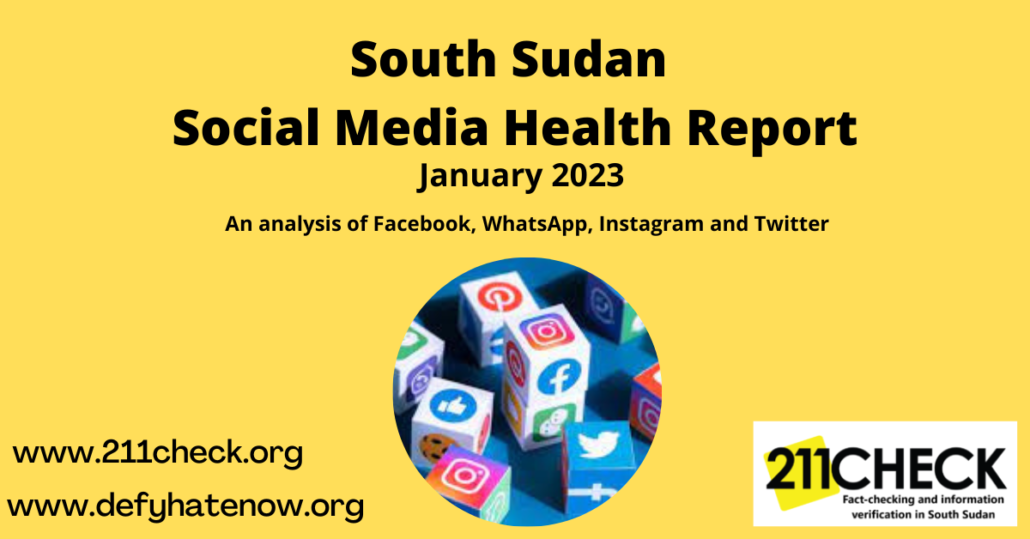Social Media Health Report, January 2023
Writer: Emmanuel Bida Thomas
The current social media health report is based on data gathered from January 1st to January 31st, 2023. It examines the most prevalent conversations on social media platforms, including Facebook, Instagram, WhatsApp, and Twitter. The study also evaluates the prevalence of hate speech, false information, and incitement to violent content shared by both South Sudanese online and those abroad related to South Sudan. The report also looks at the growth and landscape of digital and social media in South Sudan.
The report analyses the activity of the top Facebook pages, groups, Instagram accounts, and Twitter handles using tools such as CrowdTangle, Vicinitas, and other monitoring methods. The key topics featured in the report are determined by their level of engagement and attention received on social media.
Throughout the reporting period in January 2023, several social media accounts posted an average of 2 times per day, with over a thousand posts published.
Key Findings and Issues:
- 13 people were killed and five others wounded in an attack in the Abyei region on 3rd January 2023
According to a statement from the United Nations Interim Security Forces for Abyei (UNISFA), a combined armed group of Nuer and Twic Dinka launched an early morning attack on Rumamer village, 15 kilometres south of Abyei Box, killing thirteen people and injuring five others (all Ngok Dinkas), while burning down 27 houses.
The news surprised social media, and users expressed sympathy for the souls who died while also sending condolences.
Oil-rich Abyei has been a source of contention since South Sudan’s independence in July 2011. The two countries have yet to reach an agreement on border mapping.
- Graduation of over 3,000 necessary unified forces in Unity State on 15th January 2023
On January 15, 2023, at least 3,000 unified police forces graduated from the Kaljaak training centre in Unity State. Tut Gatluak Manime, the Presidential Advisor on Security Affairs, presided over the graduation and urged the police officers to protect civilians and their property.
Discussions on this development were centred around the graduation delay and the need to cater to the forces’ welfare.
- After years of feuding, singers Mary Boyoi and Lady Kola reconcile.
Mary Boyoi and Lady Kola are two South Sudanese female artists who have been feuding over some sort of disagreement. Following Promoter Kay Two’s announcement that they would perform at a Together for Peace Concert in Aweil, Northern Bahr-el-Ghazal State, Mary Boyoi stated that she would boycott the concert if Lady Kola were present.
A discussion ensued online, particularly about the importance of not having such a difference since they were attending a peace concert. The organisers had to sit both singers down, which resulted in reconciliation, and they did, indeed, perform on the same stage at the peace concert.
- Alijoma Mabil and John Frog. What went wrong?
Alijoma Mabil and John Frog, two South Sudanese male artists and their fans, began an online exchange that appeared normal but contained elements of hate speech. In early January, they called each other out on social media in several posts.
- Response to remarks by Kalisto Lado on Clubhouse
In his capacity as a leader of the Bari Community Association, the former mayor of the Juba City Council, Kalisto Lado, has spoken out against the brutal slaughter of members of his community in Mangalla at the hands of cattle herders. He claimed that the herders had the goal of “occupying” land in Central Equatoria as part of their plan.
Clubhouse, an audio platform, was used by the ethnic group of herders living in the diaspora to respond condescendingly to the allegations against them.
- The #SSOT Twitter hashtag
Using Vicinitas, a tool that tracks and analyses real-time historical tweets, tracking the hashtag #SSOT reveals no major hate speech-related or disinformation terms among the engagements on the Twitter platform during the reporting period.
The type of content being shared consists primarily of major retweets, and the majority are text-based.
Analysis:
The social media trends in South Sudan reflect a mix of reactions to current events and discussions on various topics. The attack in the Abyei region, the graduation of the unified police forces, and the reconciliation of Mary Boyoi and Lady Kola were met with sympathy and support. At the same time, the online exchange between Alijoma Mabil and John Frog contained elements of hate speech. The former mayor of Juba City Council, Kalisto Lado, spoke out against the brutal slaughter of his community. Still, the ethnic group of herders living in the diaspora used the Clubhouse platform to respond condescendingly.
The analysis of the #SSOT hashtag on Twitter showed no major hate speech or disinformation-related terms during the reporting period. However, the spread of misinformation and disinformation remains an issue of concern. The discussions on social media reflect the need for unity, peace, and the welfare of citizens and the concern over unresolved disputes and conflicts in the region.
Recommendations:
To improve social media discourse in South Sudan, it is crucial for users to adopt responsible and ethical practices. Recommendations include promoting respectful and peaceful discussions, verifying the accuracy of the information, using social media to build bridges and foster dialogue, encouraging critical thinking and fact-checking, and promoting media literacy and digital citizenship. By following these guidelines, users can contribute to a more informed and peaceful online community in South Sudan.


